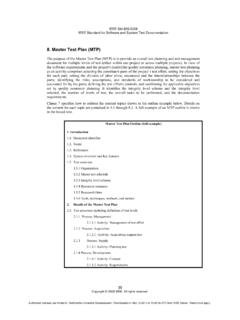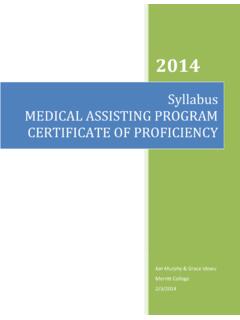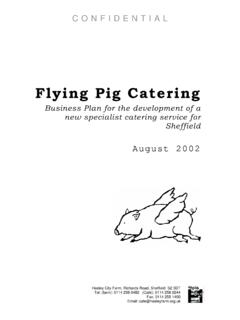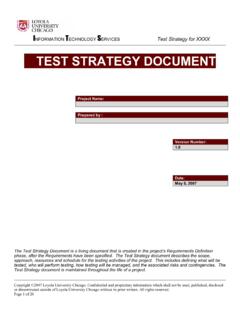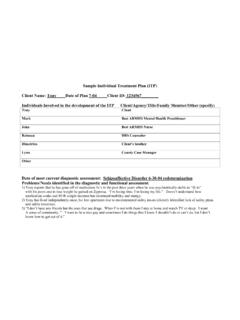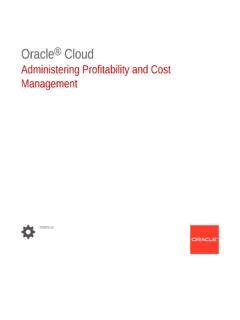Transcription of Employer Toolkit
1 0 Skills Gap Analysis Employer Toolkit February 2013 1 About Asset Skills Asset Skills is one of 21 Sector Skills Councils (SSCs) that have been established to tackle skills needs and support improvements in the productivity of different industries throughout the UK. SSCs are independent Employer -led organisations that cover different business sectors of economic or strategic significance. Asset Skills represents five industries in the UK: property (including planning), housing, facilities management , cleaning and parking. Businesses in the sector share the goal of ensuring the environment in which we work, live and spend leisure time is developed, managed and maintained to the benefit of all.
2 About the UKCES Employer Investment Fund Round Two The UK Commission for Employment and Skills (UKCES) have used the Employer Investment Fund Round Two (EIF2) to invest in activities designed to increase enterprise, jobs and growth. The funding is only available to licensed Sector Skills Councils and aims to: Stimulate leadership from the bottom up to significantly raise Employer ambition; Drive innovation, change Employer behaviours and develop new ways of working; and Secure momentum from employers to support sustainable increases in skills levels and better use of skills across sectors. The funding is supporting 61 projects over the period 2012 2014.
3 This research report is part of the Asset Skills EIF 2 Talent management programme of projects. About Insight on Demand Insight on Demand is the research and market intelligence consultancy division of Asset Skills. It specialises in providing added value and insight generating research and evaluation services. We employ dedicated consultancy and research professionals, whose expertise is in independent, insightful and high impact research, offering actionable advice and recommendations based on a robust and rigorous evidence base. Please contact Michelle Jay (Head of Programmes and Consultancy) for more information or to discuss your research requirements For more information, or if you would like to provide feedback on this research publication, contact the Insight Team on 01604 233336 or This document is available to download at 2 Contents 1.
4 Introduction .. 4 2. The Issue .. 5 3. The Solution .. 6 4. Considerations .. 7 5. The Toolkit .. 8 Identify Business Goals .. 8 Current Processes and Procedures .. 11 Identifying Job Roles .. 12 Identifying Skills Gaps .. 14 Identifying Competencies .. 15 Identifying Hidden Skills .. 16 Interpretation .. 17 Next Step .. 18 6. Summary .. 19 Further Information .. 20 Bibliography .. 21 3 Foreword We know from working closely with employers across our sectors that workforce skills are a priority for any business looking to remain competitive in the current economic landscape. The value of employee skills cannot be underestimated as they benefit employers through improved costs, greater customer satisfaction and increasing profitability.
5 With this in mind, the Asset Skills talent management project team has worked hard to develop a Toolkit based on Employer feedback that will facilitate the design and implementation of a suitable skills gap analysis tool that will support talent management and support your organisation s approach to developing competitive advantage. We hope you find this Toolkit useful and informative. As we strive to be as accurate as possible and to cover the areas of most concern to employers, please feedback to us any comments you may have. Armed with this information we can work with employers and partners to help them develop strategies to meet their requirements and develop world class skills.
6 February 2013 Sarah Bentley, Chief Executive, Asset Skills 4 1. Introduction Asset Skills is one of 21 Sector Skills Councils (SSCs) representing five sectors in the UK: property (including planning), housing, facilities management , cleaning and parking. Businesses in these industries share the goal of ensuring the environment in which we work, live and play is developed, managed and maintained to the benefit of all. To achieve this goal, employers within the Asset Skills sectors must ensure that their employees have the necessary knowledge, skills and experience required to undertake their duties competently. This can be ensured by embracing the concept of a skills gap analysis.
7 It allows employers to highlight the areas where employee skills may be lacking and thus informs them on any gaps that need to be rectified. In recent years, workplace efficiency has become a priority for employers worldwide due to the global recession and the cost cutting measures that have been implemented as a result. Completing a skills gap analysis allows organisations to stay on top of employee development, channel their resources effectively and adapt to future skills demands. Employers can use a range of different approaches following their skills gap analysis to facilitate appropriate employee development and training plans.
8 For example, relevant on the job training or continuing professional development, to membership of professional bodies and attainment of career related qualifications (Asset Skills Barometer, 2011). To support employers in implementing a successful skills gap analysis, the Asset Skills Talent management Project Team has developed a Toolkit designed to help employers conduct a skills gap analysis. Having worked through this Toolkit , employers will have reached the conclusion of their skills gap analysis and should have the information available to develop a framework for the implementation of talent management strategies to improve employees skill competencies.
9 The information presented will be of interest to individuals, providers, employers and others who wish to assess the skills base of an organisation in the future. Further research work that develops this theme will be undertaken through the Asset Skills EIF2 Talent management programme during the period October 2012 to March 2014 (funded by UKCES). 5 2. The Issue According to figures from the Office for National Statistics the knowledge and skills of workers in the UK were worth an estimated trillion in 2010 (ONS, 2011). However, some organisations experience significant skills gaps that are defined as an instance in which an individual lacks a skill in a particular area, preventing them from performing their job effectively (UKCES, 2012a).
10 Skills gaps are self-defined by employers when they perceive that an employee lacks certain skills preventing them from being fully proficient in their job role for example, the main cause of skills gaps cited by employers within the Asset Skills footprint is employees that are new to their job roles have only partially completed their training and are therefore lacking technical, practical or job specific skills required to perform their role to a high standard (UKCES, 2012a). Skills gaps can occur at an individual, departmental or organisational level at any time because staff lack critical skills (required to complete a task successfully), or non-critical skills (skills that are not essential but would enable a task to be completed more quickly or efficiently) (QFinance, 2009) due to changes in the working environment for example, as a result of new practices, policies or equipment.
